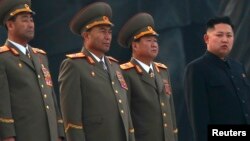For the past week, the world has been hearing almost daily threats and belligerent statements from North Korea.
While this kind of talk is not new for the government in Pyongyang, the pace and pitch of the recent pronouncements stand out. To help add perspective to these developments, VOA turned to its correspondent in Seoul, Steve Herman, and asked what might be behind Pyongyang's escalating war of words.
VOA: "Steve, after the younger Kim took over, there was sort of a long period where we didn’t hear these kinds of statements. What can you tell about why this would be happening now?"
Steve Herman: "Well, that's a good question. Now there are two things that we can point to that have been going on that would fit into the pattern of how North Korea behaves. One is they always vociferously object to the annual joint military exercises that U.S. and South Korean militaries do.
"Second: the North Koreans have a pattern of testing new South Korean presidents. And we have a new president, who was just recently inaugurated. So we can combine these two together and that would partly explain why we are seeing these sort of provocations so frequently. But a number of diplomats I've been speaking with, military officials and people in the intelligence community, concur on something that I also feel, and this is just a hunch.
"We're missing something. There is a piece of the puzzle that we don't know. There may be something else going on in Pyongyang. Whether this involves some struggle for power within the military -- or something that the North Koreans believe or fear beyond their normal types of concerns, we don't know for sure.
"We also have to remember that North Korea obviously feels under siege on the diplomatic front with the additional sanctions that have been put into place by the U.N. Security Council, including support, to some degree, for those sanctions from China, which you know, of course, has to be North Korea's sole significant ally since the demise of the Soviet Union. So as much as some of this is directed at the United States, some of this may also be directed to get something out of China as well."
VOA: "The thought often is in North Korea that the real power lies with the military generals. Do you have any sense of whether or not that's the case?"
Steve Herman: "I would be very cautious about anyone who jumps to conclusions that Kim Jong Un is 'not in charge.' He is the hereditary ruler of North Korea. That has been very important in Korean history. That blood tie to his grandfather is the foundation of the Democratic Peoples of the Republic of Korea and I don't think we should forget that. The other thing that always must be kept in mind with North Korea: the military comes first in North Korea. Period. Full stop. Even though Kim Jong Un may be only about 30 years old, has spent part of his early days being educated in Europe, but he was the one over his other brothers selected by his father."
While this kind of talk is not new for the government in Pyongyang, the pace and pitch of the recent pronouncements stand out. To help add perspective to these developments, VOA turned to its correspondent in Seoul, Steve Herman, and asked what might be behind Pyongyang's escalating war of words.
VOA: "Steve, after the younger Kim took over, there was sort of a long period where we didn’t hear these kinds of statements. What can you tell about why this would be happening now?"
Steve Herman: "Well, that's a good question. Now there are two things that we can point to that have been going on that would fit into the pattern of how North Korea behaves. One is they always vociferously object to the annual joint military exercises that U.S. and South Korean militaries do.
"Second: the North Koreans have a pattern of testing new South Korean presidents. And we have a new president, who was just recently inaugurated. So we can combine these two together and that would partly explain why we are seeing these sort of provocations so frequently. But a number of diplomats I've been speaking with, military officials and people in the intelligence community, concur on something that I also feel, and this is just a hunch.
"We're missing something. There is a piece of the puzzle that we don't know. There may be something else going on in Pyongyang. Whether this involves some struggle for power within the military -- or something that the North Koreans believe or fear beyond their normal types of concerns, we don't know for sure.
"We also have to remember that North Korea obviously feels under siege on the diplomatic front with the additional sanctions that have been put into place by the U.N. Security Council, including support, to some degree, for those sanctions from China, which you know, of course, has to be North Korea's sole significant ally since the demise of the Soviet Union. So as much as some of this is directed at the United States, some of this may also be directed to get something out of China as well."
VOA: "The thought often is in North Korea that the real power lies with the military generals. Do you have any sense of whether or not that's the case?"
Steve Herman: "I would be very cautious about anyone who jumps to conclusions that Kim Jong Un is 'not in charge.' He is the hereditary ruler of North Korea. That has been very important in Korean history. That blood tie to his grandfather is the foundation of the Democratic Peoples of the Republic of Korea and I don't think we should forget that. The other thing that always must be kept in mind with North Korea: the military comes first in North Korea. Period. Full stop. Even though Kim Jong Un may be only about 30 years old, has spent part of his early days being educated in Europe, but he was the one over his other brothers selected by his father."








